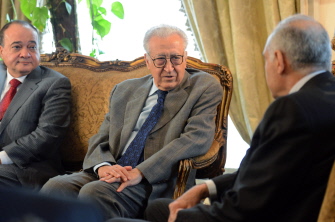From Libya to Egypt to fuel-strapped Jordan, Arab countries have signaled their desire to develop nuclear power, even amid a concerted attempt by the United States to tighten the noose around Iran lest it join the nuclear club. These new players are entering a nuclear race in an unstable zone, dominated by two regional powers, Iran and Israel. Jordan, whose oil bill devours 20 percent of its GNP, has been seeking American, Pakistani and Russian expertise to build a civilian reactor after the discovery of uranium in its southern desert. Libya and Egypt-with possible Saudi funding-have floated similar projects. The Arab quest for nuclear know-how remains restricted to international conditions and the terms of suppliers. But dangers lurk from two directions that are already on a collision course: Iran is pressing ahead with is nuclear program despite Western concerns it is enriching uranium in order to build nuclear weapons; and unofficial estimates put Israel’s nuclear arsenal at 200 warheads at least. While Jordan and other states acknowledge Iran’s right to obtain nuclear technology for civilian purposes, they fear that Iran is really out to develop a military program, to better impose its agenda on the Arab world. This fear has become especially acute in view of Iran’s growing influence over a vanquished Iraq. Arab states will never accept Iran becoming a nuclear power unless it provides cast-iron guarantees that its nuclear technology is for power generation only, alongside an Iranian acknowledgement of national Arab interests, boundaries and the common interest to live in a stable region. But Iran’s controversial President Mahmoud Ahmadinejad continues to project an intent to dominate the region. Arab countries are awaiting a clear signal that Tehran, so influential over Shiite groups in Iraq and Lebanon amid growing sectarian strife as well as over Sunni groups in the Palestinian territories, will not pursue an expansionist policy. The same conditions may be said to apply to Israel as far as Arab countries are concerned. There are two important differences, however. Unlike Iran, Israel is not a signatory to the nuclear Non-Proliferation Treaty. In addition, the country has already imposed a de facto situation ever since Israel obtained nuclear technology from France in the 1960s. It is in this context that the coy leaks and press statements of Arab governments regarding their pursuit of nuclear technology should be read. These statements are primarily aimed at Israel and Iran and are a warning that the two powers must heed the interests of the countries that lie in the middle of their power struggle. It is an Arab nuclear “policy undertaken with the full realization of the limitations of the post-Soviet reality of a single pro-Israel world superpower. The hidden hatchets in Israel and Iran and the US-Iranian standoff are major sources of anxiety for neighboring Arab states, especially the self-styled “moderate quartet of Jordan, Egypt, Saudi Arabia and the United Arab Emirates. However, not all Arab countries are on the same page. Qatar and Syria are playing a rather dubious role if Western diplomats are to be believed. Both countries remain indifferent as to the looming confrontation over the nuclear file. They even appear willing to spark further upheavals across the region to reshuffle the cards in light of America’s descent into the Iraqi quagmire. Jordan lies at the heart of the turmoil, given Iran’s increasing strategic and intelligence role in occupied Iraq, once the Hashemite Kingdom’s fortified “eastern gate. Jordan’s quest to build a nuclear reactor is limited to civilian purposes, according to King Abdullah II, who maintains it has long been on the national agenda as a substitute fuel source. But sandwiched between two arch foes armed to the teeth, Jordan is seeking guarantees against an ever-nearing precipice, with Washington pursuing an aggressive policy vis-a-vis Iran in an already boiling region. Arab countries – already reeling thanks to the Iraqi quagmire, the Lebanese imbroglio and a stalemate on the Palestinian-Israeli track – are weary of the tempo of war, now reverberating across the region. There is growing fear that Washington might yet spark a war with Iran, three and a half years after the invasion of Iraq. Such a notion would be a recipe for disaster. Iraq’s wounds are still open. Lebanon potentially could find itself in a civil war. Hope is fading for a settlement to the Palestinian-Israeli conflict-the region’s core crisis. If the US strikes Iran, Iraq’s “organized chaos is likely to spill over into neighboring countries. Moreover, the growing Shiite-Sunni schism within the war-torn country could erupt across already volatile communities in Saudi Arabia, Bahrain and even in Kuwait. Saad Hattaris a BBC Arabic correspondent in Jordan. This commentary first appeared at bitterlemons-international.org, an online newsletter presenting diverse views on Middle Eastern and Islamic issues.
